BusinessEurope Headlines No. 2017-13
B7 conveys a strong message against protectionism
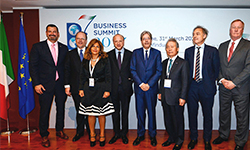 During their meeting in Rome on 30-31 March, the B7 urged the G7 to work on improving global trade governance and promote innovation and sustainability. B7 is the business side of the G7 process, representing the business world of the G7 countries. Trade, innovation and sustainability are the most important drivers of growth and job creation, of new products and services that aim to improve consumers’ choice and quality of life. At the same time, the B7 recognises that more needs to be done in order for the benefits of trade and globalisation to be distributed more equally and effectively to all countries and parts of the society. In this context, businesses stand ready to cooperate more closely with governments and the civil society. Representing BusinessEurope, President Emma Marcegaglia stated: “Today, many governments are tempted to use protectionism as an answer to the challenges global society faces. Our message as B7 is loud and clear: protectionism is not the solution. The solution is developing the right and mutually supporting policies to foster innovation, improve competitiveness and promote inclusiveness.” A joint declaration summarises the recommendations of the B7 and will be communicated to the G7 ahead of their summit on 26-27 May in Taormina, Sicily.
During their meeting in Rome on 30-31 March, the B7 urged the G7 to work on improving global trade governance and promote innovation and sustainability. B7 is the business side of the G7 process, representing the business world of the G7 countries. Trade, innovation and sustainability are the most important drivers of growth and job creation, of new products and services that aim to improve consumers’ choice and quality of life. At the same time, the B7 recognises that more needs to be done in order for the benefits of trade and globalisation to be distributed more equally and effectively to all countries and parts of the society. In this context, businesses stand ready to cooperate more closely with governments and the civil society. Representing BusinessEurope, President Emma Marcegaglia stated: “Today, many governments are tempted to use protectionism as an answer to the challenges global society faces. Our message as B7 is loud and clear: protectionism is not the solution. The solution is developing the right and mutually supporting policies to foster innovation, improve competitiveness and promote inclusiveness.” A joint declaration summarises the recommendations of the B7 and will be communicated to the G7 ahead of their summit on 26-27 May in Taormina, Sicily.
![]() Contact: Luisa Santos
Contact: Luisa Santos
Warning against possible overlaps of the EU energy & climate framework
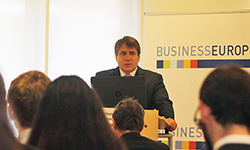 “The EU should make sure that the proposed design of policy instruments in the ‘clean energy’ package, such as energy efficiency targets, does not undermine the ongoing EU ETS reform”, BusinessEurope Director General Markus J. Beyrer stressed at a workshop on 30 March. In the context of the current discussions on the new package at the European Parliament and Council, Mr Beyrer voiced substantial concerns about coherency and consistency of the current energy and climate dossiers. At the energy workshop organised by BusinessEurope and Eurelectric, representatives of industry, the European Commission and EU Member States discussed whether current proposals do not pose a risk of overlaps. BusinessEurope already acknowledged a number of positive elements in the new energy package, strengthening the power market and role of consumers, but also warned against concrete and imminent risks due to an incoherent approach. Together with other stakeholders, Markus J. Beyrer called on the EU institutions to ensure a more coordinated legislative process and governance, as well as a robust impact assessment of proposals in terms of their mutual interactions.
“The EU should make sure that the proposed design of policy instruments in the ‘clean energy’ package, such as energy efficiency targets, does not undermine the ongoing EU ETS reform”, BusinessEurope Director General Markus J. Beyrer stressed at a workshop on 30 March. In the context of the current discussions on the new package at the European Parliament and Council, Mr Beyrer voiced substantial concerns about coherency and consistency of the current energy and climate dossiers. At the energy workshop organised by BusinessEurope and Eurelectric, representatives of industry, the European Commission and EU Member States discussed whether current proposals do not pose a risk of overlaps. BusinessEurope already acknowledged a number of positive elements in the new energy package, strengthening the power market and role of consumers, but also warned against concrete and imminent risks due to an incoherent approach. Together with other stakeholders, Markus J. Beyrer called on the EU institutions to ensure a more coordinated legislative process and governance, as well as a robust impact assessment of proposals in terms of their mutual interactions.
Contact: Jan Bambas
Key positions on EU ETS
 Ahead of the first trialogue meeting on 4 April between the European Commission, Council and Parliament on the reform of the European emission trading scheme (EU ETS), BusinessEurope sent the negotiators its key positions in this crucial final phase of the reform. “BusinessEurope has high expectations from the trialogue negotiations to strike the right balance on the reform of the EU ETS”, BusinessEurope Director General Markus J. Beyrer wrote in an email to negotiators. “While a more meaningful carbon price is important to drive low-carbon investment in Europe, strong measures to safeguard the competitiveness of industry on a global scale are equally important”, he added.
Ahead of the first trialogue meeting on 4 April between the European Commission, Council and Parliament on the reform of the European emission trading scheme (EU ETS), BusinessEurope sent the negotiators its key positions in this crucial final phase of the reform. “BusinessEurope has high expectations from the trialogue negotiations to strike the right balance on the reform of the EU ETS”, BusinessEurope Director General Markus J. Beyrer wrote in an email to negotiators. “While a more meaningful carbon price is important to drive low-carbon investment in Europe, strong measures to safeguard the competitiveness of industry on a global scale are equally important”, he added.
![]() Contact: Leon de Graaf
Contact: Leon de Graaf
Getting people back to work remains on top of the agenda
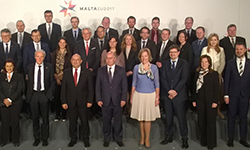 Europe's labour market challenges vary between EU Member States, with some still facing unaddressed structural reasons for unemployment, and others increasingly faced with labour shortages. Two key EU-wide challenges are to reduce the tax wedge on labour and to avoid benefit dependency by ensuring that work is a more attractive option than benefits for jobseekers. Improving national policy frameworks through the necessary reforms to address these challenges should be at the core of efforts by Member States and social partners to make work pay. These were the key messages by Stefania Rossi, Vice-Chair of BusinessEurope Social Affairs Committee, during the informal Employment and Social Affairs Council held in Malta on 3-4 April 2017.
Europe's labour market challenges vary between EU Member States, with some still facing unaddressed structural reasons for unemployment, and others increasingly faced with labour shortages. Two key EU-wide challenges are to reduce the tax wedge on labour and to avoid benefit dependency by ensuring that work is a more attractive option than benefits for jobseekers. Improving national policy frameworks through the necessary reforms to address these challenges should be at the core of efforts by Member States and social partners to make work pay. These were the key messages by Stefania Rossi, Vice-Chair of BusinessEurope Social Affairs Committee, during the informal Employment and Social Affairs Council held in Malta on 3-4 April 2017.
Contact: Maxime Cerutti
Circular economy can create new jobs and makes business sense
 We must understand the challenges of small and medium-sized enterprises and other companies when moving to a circular economy”, BusinessEurope International Affairs Director Luisa Santos stressed at an international workshop on resource efficiency on 30 March. “Fortunately, business is already doing a lot, because it makes business sense. For every 10,000 tons of waste generated, more than 40 jobs can be created in the recycling sector, versus only 1 if waste is incinerated”, she continued. BusinessEurope is setting up an EU circular economy industry platform, estimated to be ready in May, to showcase how EU business is adding to the circular economy/resource efficiency and what (regulatory) barriers businesses face in this shift towards circularity. The international workshop was hosted by the Global Business Coalition and the Italian business federation Confindustria, ahead of the B7 business summit in Rome. Interested to submit your example(s) to the industry platform? Submit them here. (This link is temporary until the website is up and running).
We must understand the challenges of small and medium-sized enterprises and other companies when moving to a circular economy”, BusinessEurope International Affairs Director Luisa Santos stressed at an international workshop on resource efficiency on 30 March. “Fortunately, business is already doing a lot, because it makes business sense. For every 10,000 tons of waste generated, more than 40 jobs can be created in the recycling sector, versus only 1 if waste is incinerated”, she continued. BusinessEurope is setting up an EU circular economy industry platform, estimated to be ready in May, to showcase how EU business is adding to the circular economy/resource efficiency and what (regulatory) barriers businesses face in this shift towards circularity. The international workshop was hosted by the Global Business Coalition and the Italian business federation Confindustria, ahead of the B7 business summit in Rome. Interested to submit your example(s) to the industry platform? Submit them here. (This link is temporary until the website is up and running).
Contact: Leon de Graaf
Maximising the impact of EU research and innovation programmes
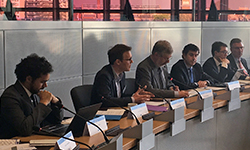 “The framework conditions for a pro-innovation ecosystem in Europe are manifold, starting from a more risk-taking culture to the regulatory environment, skilled labour force and funding. In many cases, public spending is crucial to leverage the necessary funding for large-scale innovate projects”, BusinessEurope Industrial Affairs Director Alexandre Affre commented at a stakeholder panel discussion organised by the high-level group on maximising the impact of EU research and innovation programmes, chaired by Pascal Lamy. Alexandre Affre also stressed the importance of preserving the existing three-pillar architecture and warned against the risk of Europe facing an “innovation leakage” if large companies would be left outside the next framework programme.
“The framework conditions for a pro-innovation ecosystem in Europe are manifold, starting from a more risk-taking culture to the regulatory environment, skilled labour force and funding. In many cases, public spending is crucial to leverage the necessary funding for large-scale innovate projects”, BusinessEurope Industrial Affairs Director Alexandre Affre commented at a stakeholder panel discussion organised by the high-level group on maximising the impact of EU research and innovation programmes, chaired by Pascal Lamy. Alexandre Affre also stressed the importance of preserving the existing three-pillar architecture and warned against the risk of Europe facing an “innovation leakage” if large companies would be left outside the next framework programme.
Contact: Alexandre Affre
Parliament should acknowledge the success of the Privacy Shield
 In light of the upcoming European Parliament plenary vote on the Civil Liberties, Justice and Home Affairs Committee (LIBE) motion for a Resolution on the EU-US Privacy Shield, BusinessEurope sent a letter to all MEPs informing them that we do not believe it correctly reflects its achievements. Not only does the resolution presuppose shortcomings of the Privacy Shield before its wider inclusive annual review, but it fails to acknowledge Parliament’s own 2016 resolution acknowledging its safeguards. The Privacy Shield has not altered since. In fact, it is an improvement on its predecessor (the Safe Harbour Agreement), setting a high standard of protection for Europeans’ personal data. As a result, it has become an intrinsic part of transatlantic trade. To read the full letter – click here.
In light of the upcoming European Parliament plenary vote on the Civil Liberties, Justice and Home Affairs Committee (LIBE) motion for a Resolution on the EU-US Privacy Shield, BusinessEurope sent a letter to all MEPs informing them that we do not believe it correctly reflects its achievements. Not only does the resolution presuppose shortcomings of the Privacy Shield before its wider inclusive annual review, but it fails to acknowledge Parliament’s own 2016 resolution acknowledging its safeguards. The Privacy Shield has not altered since. In fact, it is an improvement on its predecessor (the Safe Harbour Agreement), setting a high standard of protection for Europeans’ personal data. As a result, it has become an intrinsic part of transatlantic trade. To read the full letter – click here.
![]() Contact: Patrick Grant
Contact: Patrick Grant
CETA: ensuring swift and effective implementation
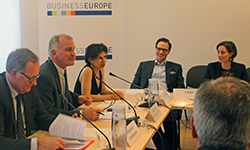 “It is important to raise awareness among businesses of the new opportunities opened by CETA – the EU-Canada trade agreement – so that they can reap the benefits of the agreement as soon as it enters into force”, Luisa Santos, Director of International Relations at BusinessEurope, said at the event “CETA – Ensuring Good Implementation”, organised jointly with the Canada Europe Round Table for Business (CERT) on 4 April. Daniel Costello, Ambassador of Canada to the European Union and Joost Korte, Deputy Director General at the European Commission’s DG Trade, participated in the meeting and invited European and Canadian business to share their success stories. Examples of the benefits experienced by companies of all sizes thanks to the provisional implementation of CETA will encourage a high preference utilisation rate and ultimately help ensure full ratification of the agreement.
“It is important to raise awareness among businesses of the new opportunities opened by CETA – the EU-Canada trade agreement – so that they can reap the benefits of the agreement as soon as it enters into force”, Luisa Santos, Director of International Relations at BusinessEurope, said at the event “CETA – Ensuring Good Implementation”, organised jointly with the Canada Europe Round Table for Business (CERT) on 4 April. Daniel Costello, Ambassador of Canada to the European Union and Joost Korte, Deputy Director General at the European Commission’s DG Trade, participated in the meeting and invited European and Canadian business to share their success stories. Examples of the benefits experienced by companies of all sizes thanks to the provisional implementation of CETA will encourage a high preference utilisation rate and ultimately help ensure full ratification of the agreement.
Contact: Eleonora Catella
Advancing work on international patent cooperation
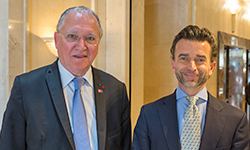 BusinessEurope, with its intellectual property partners from the USA and Japan, met the Presidents of the European, US and Japanese patent offices on 29 March in Seville, Spain. Industries and patent offices took stock of the progress of their cooperation activities, exchanged views on substantive patent law harmonisation as well as harmonisation of procedures. BusinessEurope's priority in the field of international patent cooperation is to relieve European companies filing globally from unnecessary burden, red tape and excessive costs.
BusinessEurope, with its intellectual property partners from the USA and Japan, met the Presidents of the European, US and Japanese patent offices on 29 March in Seville, Spain. Industries and patent offices took stock of the progress of their cooperation activities, exchanged views on substantive patent law harmonisation as well as harmonisation of procedures. BusinessEurope's priority in the field of international patent cooperation is to relieve European companies filing globally from unnecessary burden, red tape and excessive costs.
Contact: Ilias Konteas
James Watson speaks at EU Tax Adviser’s Forum
 “While a Common Consolidated Corporate Tax Base (CCCTB) has the potential to increase growth and jobs, the European Commission’s proposal for a CCCTB needs to be further developed to better support competitiveness and growth”, was the key message of James Watson, BusinesseEurope Economics Director, at the Annual Forum of the Confederation Fiscale Europeenne, Europe’s professional association for tax advisors. Drawing on BusinessEurope’s recently published position paper at the event held in Brussels on 30 March, Watson also noted that according to the European Commission’s estimates, the potential benefits of a CCCTB are much larger if consolidation (ie. offsetting of profits and losses between Member States) is included. BusinessEurope is concerned that a CCTB (ie. without consolidation) might be taken forward bringing costs but few benefits. James Watson also noted that both the allocation key and the investment allowances proposed by the Commission could better reflect modern business models if they better recognised intangible investment – research and development, training, brand development - which has been growingly important in the EU economy in recent years.
“While a Common Consolidated Corporate Tax Base (CCCTB) has the potential to increase growth and jobs, the European Commission’s proposal for a CCCTB needs to be further developed to better support competitiveness and growth”, was the key message of James Watson, BusinesseEurope Economics Director, at the Annual Forum of the Confederation Fiscale Europeenne, Europe’s professional association for tax advisors. Drawing on BusinessEurope’s recently published position paper at the event held in Brussels on 30 March, Watson also noted that according to the European Commission’s estimates, the potential benefits of a CCCTB are much larger if consolidation (ie. offsetting of profits and losses between Member States) is included. BusinessEurope is concerned that a CCTB (ie. without consolidation) might be taken forward bringing costs but few benefits. James Watson also noted that both the allocation key and the investment allowances proposed by the Commission could better reflect modern business models if they better recognised intangible investment – research and development, training, brand development - which has been growingly important in the EU economy in recent years.
![]() Contact: Pieter Baert
Contact: Pieter Baert
Ensuring legal certainty for data privacy in Europe and for international data transfers
 The European Commission will play a crucial role as a coordinator for EU Member States to prepare to apply the General Data Protection Regulation (GDPR). The Commission should ensure consistent national application and clarity for businesses as the implementation deadline approaches (May 2018). This was highlighted by Guido Lobrano at the Commission’s GDPR workshop held on 6 April. The Commissions new strategy on international data transfers, based on their January 2017 Communication, must provide legal certainty for businesses both using existing instruments (eg. adequacy decisions, standard contractual clauses, binding corporate rules, etc.) and newer transfer mechanisms.
The European Commission will play a crucial role as a coordinator for EU Member States to prepare to apply the General Data Protection Regulation (GDPR). The Commission should ensure consistent national application and clarity for businesses as the implementation deadline approaches (May 2018). This was highlighted by Guido Lobrano at the Commission’s GDPR workshop held on 6 April. The Commissions new strategy on international data transfers, based on their January 2017 Communication, must provide legal certainty for businesses both using existing instruments (eg. adequacy decisions, standard contractual clauses, binding corporate rules, etc.) and newer transfer mechanisms.
Contact: Guido Lobrano
The Global Business Coalition meets the International Resource Panel co-chair
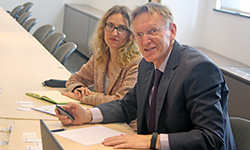 Meeting the demand for natural resources in a sustainable way is one of the main challenges of our time. The use of raw materials grew at about twice the rate of the population growth over the last century. Industry and business, through innovative technologies and solutions, have a great role to play in meeting economic needs in a more efficient way. On 4 April, the Global Business Coalition (GBC), which has made resource efficiency a priority, discussed those challenges and opportunities with Janez Potočnik, co-chair of the International Resource Panel. The GBC, which brings together leading business organisations from major world economies, is committed to supporting G7 and G20 leaders in developing an international policy framework on resource efficiency that benefits from the experience of business.
Meeting the demand for natural resources in a sustainable way is one of the main challenges of our time. The use of raw materials grew at about twice the rate of the population growth over the last century. Industry and business, through innovative technologies and solutions, have a great role to play in meeting economic needs in a more efficient way. On 4 April, the Global Business Coalition (GBC), which has made resource efficiency a priority, discussed those challenges and opportunities with Janez Potočnik, co-chair of the International Resource Panel. The GBC, which brings together leading business organisations from major world economies, is committed to supporting G7 and G20 leaders in developing an international policy framework on resource efficiency that benefits from the experience of business.
Contact: Alexandre Affre
Europe needs a harmonised and ambitious Single Digital Gateway
 The European Commission is set to release its Compliance Package on 26 April that will improve enforcement and functioning of EU Single Market rules. A part of this will be dedicated to constructing the Single Digital Gateway (SDG), an online single market portal that would enable companies to access clear and precise information, use problem solving tools and complete administrative procedures online. As BusinessEurope fully supports the creation of a one-stop shop to support businesses operating cross-border, it has sent a letter to the European Commission reinstating the importance of a harmonised approach to streamline existing national single market tools. We also highlight the need for an ambitious proposal, as originally intended by the Commission, that enables various administrative procedures to be carried out online. This will be crucial for successful business uptake. To read the full letter – click here. To read our original position on the SDG – click here.
The European Commission is set to release its Compliance Package on 26 April that will improve enforcement and functioning of EU Single Market rules. A part of this will be dedicated to constructing the Single Digital Gateway (SDG), an online single market portal that would enable companies to access clear and precise information, use problem solving tools and complete administrative procedures online. As BusinessEurope fully supports the creation of a one-stop shop to support businesses operating cross-border, it has sent a letter to the European Commission reinstating the importance of a harmonised approach to streamline existing national single market tools. We also highlight the need for an ambitious proposal, as originally intended by the Commission, that enables various administrative procedures to be carried out online. This will be crucial for successful business uptake. To read the full letter – click here. To read our original position on the SDG – click here.
![]()
![]() Contact: Patrick Grant
Contact: Patrick Grant
Debating with national Data Protection Authorities at FabLab
 Data Protection Authorities (DPAs) in the EU Member States will play a crucial role in the concrete enforcement of the General Data Protection Regulation (GDPR) which enters into force in May 2018. On 5-6 April, BusinessEurope joined the second FabLab event organised by the European group of all DPAs to discuss future guidelines for the application of key GDPR provisions (consent, profiling and data breach notification). We underlined profiling guidelines need a flexible, transparent and business-friendly framework. This should enhance the trust of data users.
Data Protection Authorities (DPAs) in the EU Member States will play a crucial role in the concrete enforcement of the General Data Protection Regulation (GDPR) which enters into force in May 2018. On 5-6 April, BusinessEurope joined the second FabLab event organised by the European group of all DPAs to discuss future guidelines for the application of key GDPR provisions (consent, profiling and data breach notification). We underlined profiling guidelines need a flexible, transparent and business-friendly framework. This should enhance the trust of data users.
Contact: Guido Lobrano
Revive securitisation markets
 Restoring confidence in securitisation will play an important role in allowing banks to free up their balance sheets and extend lending, BusinessEurope Director General Markus J. Beyrer, wrote to Members of the European Parliament and governments of the EU Member States in view of the on
Restoring confidence in securitisation will play an important role in allowing banks to free up their balance sheets and extend lending, BusinessEurope Director General Markus J. Beyrer, wrote to Members of the European Parliament and governments of the EU Member States in view of the on- 7 April 2017: Eurogroup, La Valetta, Malta
- 16 April 2017: Turkish constitutional referendum
- 24 April 2017: Consumer and Competition Day, La Valetta, Malta
